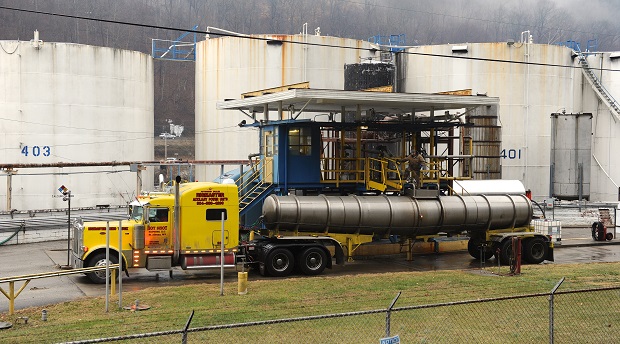300,000 told not to use water in US chemical spill

Workers pump 4-methylcyclohexane methanol, a foaming agent used in the coal preparation process, out of a 48,000-gallon tank at Freedom Industries, a chemical storage facility, in Charleston, W.Va., on Friday, Jan. 10, 2014. The White House has issued a federal disaster declaration in West Virginia, where a chemical spill that may have contaminated tap water has led officials to tell at least 300,000 people not to bathe, brush their teeth or wash their clothes. The West Virginia National Guard planned to distribute bottled drinking water to emergency services agencies in the nine affected counties. About 100,000 water customers, or 300,000 people total, were affected, state officials said. AP/Tyler Evert
CHARLESTON, West Virginia — The White House has issued a federal disaster declaration in West Virginia, where a chemical spill that may have contaminated tap water has led officials to tell at least 300,000 people not to bathe, brush their teeth or wash their clothes.
The chemical, a foaming agent used in the coal preparation process, leaked Thursday from a tank at Freedom Industries, overran a containment area and went into the Elk River.
The spill shut down much of the rural state’s capital city and surrounding counties, even as the cause and extent of the incident remained unclear.
Schools and restaurants closed, and grocery stores sold out of bottled water.
“It was chaos, that’s what it was,” convenience store cashier Danny Cardwell said.
Article continues after this advertisementOfficials said they were not sure what hazard the spill posed to residents. It was not immediately clear how much of the chemical spilled into the river and at what concentration.
Article continues after this advertisement“I don’t know if the water is not safe,” West Virginia American Water company president Jeff McIntyre said. “Until we get out and flush the actual system and do more testing, we can’t say how long this (advisory) will last at this time.”
Kanawha County emergency officials said the chemical is called 4-methylcyclohexane methanol. McIntyre said the chemical isn’t lethal in its strongest form.
According to a fact sheet from biotechnology company Fisher Scientific, the chemical is harmful if swallowed — and could be so if inhaled — and causes eye and skin irritation.
Officials from Freedom, a manufacturer of chemicals for the mining, steel, and cement industries, haven’t commented since the spill, but a woman who answered the phone at the company said it would issue a statement Friday.
Bill Hines with the Federal Emergency Management Agency said the emergency declaration allows for direct federal assistance in dealing with the spill.
The West Virginia National Guard planned to distribute bottled drinking water to emergency services agencies in the nine affected counties. About 100,000 water customers, or 300,000 people total, were affected, state officials said.
Early Friday, Department of Military Affairs and Public Safety spokesman Lawrence Messina said he wasn’t aware of any hospitals closing and that area medical centers “seemed to have adequate water supply, at least for the short term.”